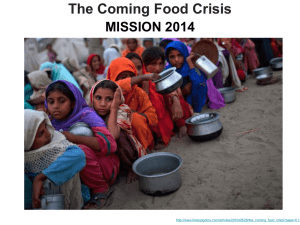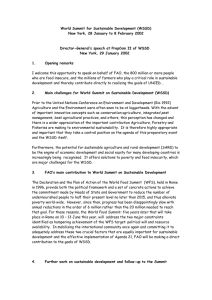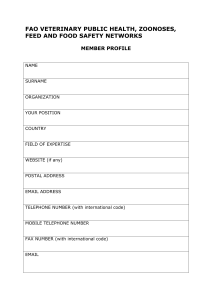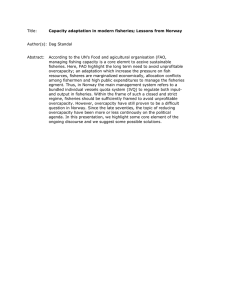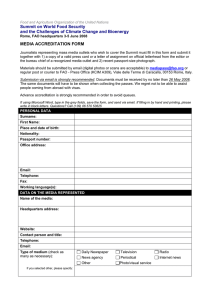CHALLENGES AND OPPORTUNITIES FOR THE WORLD SUMMIT ON INTRODUCTION
advertisement
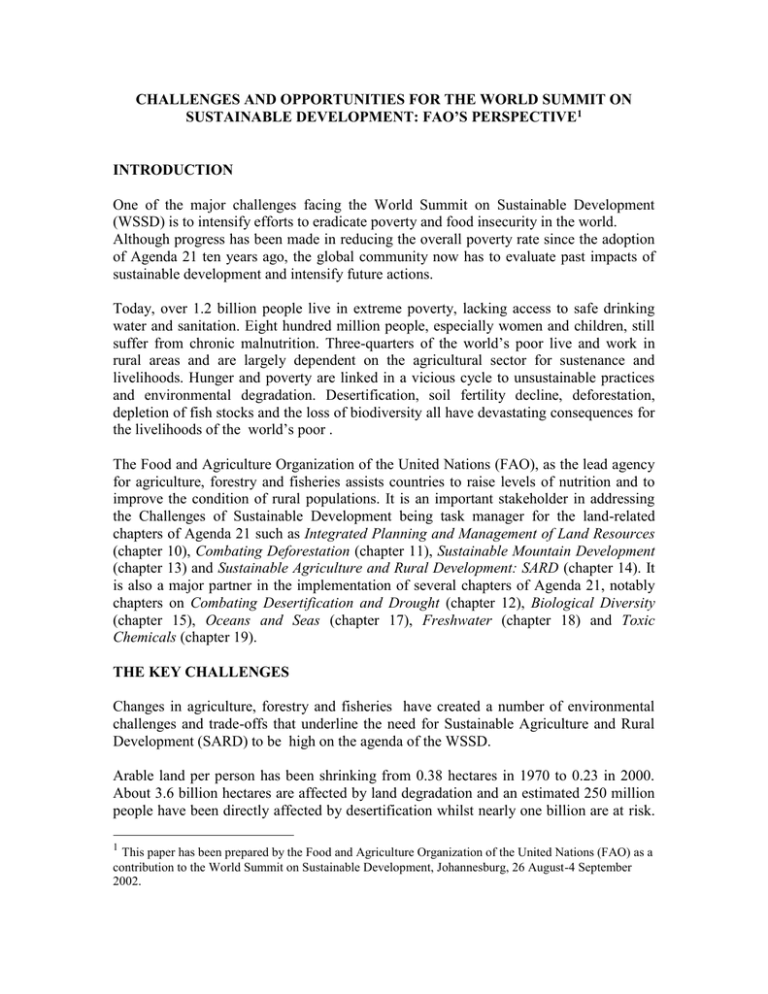
CHALLENGES AND OPPORTUNITIES FOR THE WORLD SUMMIT ON SUSTAINABLE DEVELOPMENT: FAO’S PERSPECTIVE1 INTRODUCTION One of the major challenges facing the World Summit on Sustainable Development (WSSD) is to intensify efforts to eradicate poverty and food insecurity in the world. Although progress has been made in reducing the overall poverty rate since the adoption of Agenda 21 ten years ago, the global community now has to evaluate past impacts of sustainable development and intensify future actions. Today, over 1.2 billion people live in extreme poverty, lacking access to safe drinking water and sanitation. Eight hundred million people, especially women and children, still suffer from chronic malnutrition. Three-quarters of the world’s poor live and work in rural areas and are largely dependent on the agricultural sector for sustenance and livelihoods. Hunger and poverty are linked in a vicious cycle to unsustainable practices and environmental degradation. Desertification, soil fertility decline, deforestation, depletion of fish stocks and the loss of biodiversity all have devastating consequences for the livelihoods of the world’s poor . The Food and Agriculture Organization of the United Nations (FAO), as the lead agency for agriculture, forestry and fisheries assists countries to raise levels of nutrition and to improve the condition of rural populations. It is an important stakeholder in addressing the Challenges of Sustainable Development being task manager for the land-related chapters of Agenda 21 such as Integrated Planning and Management of Land Resources (chapter 10), Combating Deforestation (chapter 11), Sustainable Mountain Development (chapter 13) and Sustainable Agriculture and Rural Development: SARD (chapter 14). It is also a major partner in the implementation of several chapters of Agenda 21, notably chapters on Combating Desertification and Drought (chapter 12), Biological Diversity (chapter 15), Oceans and Seas (chapter 17), Freshwater (chapter 18) and Toxic Chemicals (chapter 19). THE KEY CHALLENGES Changes in agriculture, forestry and fisheries have created a number of environmental challenges and trade-offs that underline the need for Sustainable Agriculture and Rural Development (SARD) to be high on the agenda of the WSSD. Arable land per person has been shrinking from 0.38 hectares in 1970 to 0.23 in 2000. About 3.6 billion hectares are affected by land degradation and an estimated 250 million people have been directly affected by desertification whilst nearly one billion are at risk. 1 This paper has been prepared by the Food and Agriculture Organization of the United Nations (FAO) as a contribution to the World Summit on Sustainable Development, Johannesburg, 26 August-4 September 2002. Global forest cover declined by a net 9.4 million hectares per year between 1990 and 2000. World fish stocks are being threatened by overfishing, destructive fishing practices, habitat loss and degradation largely due to land-based activities. Nearly three-quarters of the genetic diversity of agricultural crops and some 1,000 domestic animal breeds have been lost in the last century. As environmental degradation is ongoing, food and livelihood needs of the growing world population, expected to reach 8 billion by the year 2030, must be met. Therefore urgent actions are needed to ensure production of, and access to, sufficient and good quality food for everyone, while sustainably managing the environment. FAO wishes to emphasise four critical aspects of the poverty and food insecurity challenge. First, environmental degradation and poverty are strongly linked. Efforts to reduce poverty and hunger should therefore be accompanied by, if not predicated on, good environmental management. Ecosystem-based and participatory approaches in fisheries, forestry and farming contribute to this. There is a need for a new paradigm of development that encourages the most sustainable, productive and appropriate use of land, water and genetic resources. Supporting initiatives based on sustainable forest management, the proper implementation of the code of conduct for responsible fisheries and sustainable use of natural resources at farm, community, watershed and ecosystem level are only a few examples of how this can be achieved. Second, accelerating the fight against hunger is dependent on a strong political will. Political actions need the participation not only of world leaders and politicians but also of the private sector and concerned citizens in developed and developing countries. The struggle against poverty is the shared responsibility of all. At the international level, political will is needed to improve regulatory frameworks on governance of fisheries, forestry and agriculture including the elimination of barriers to trade and subsidies on agricultural exports from developed countries. At the national and local level, greater political will is needed to achieve more efficient, transparent and accountable governance with the devolution and decentralisation of decision making to the main stakeholders in rural development. Third, it is vitally important for WSSD to press for actions to raise capital resources as fighting hunger needs more capital and human resources than low-income developing countries can afford. Greater investment in basic infrastructure is critical for overall economic development. It is vital for food security and food availability during floods and droughts, which are likely to become more frequent and more extreme with climate change. Many poor countries, especially those in Africa, lack the capital to maintain even their existing infrastructure. They are severely constrained by low economic growth, high debt repayments, economic and fiscal shocks, vulnerability to unpredictable climate shocks and high incidences of HIV/AIDS. The WSSD must help to reverse the decline in official development assistance to sustainable agriculture and rural development, forestry and fisheries and increase the flow of foreign direct investment to agriculture and the 1 rural sector of the poorest countries. Whereas in developed countries the shift from agriculture to industry and services has already taken place as a normal process of economic development, it occurs often prematurely for developing countries, resulting in marginalization of the rural population and hindering progress in overcoming hunger and poverty. Finally, although progress since 1992 in reducing poverty and food insecurity is less successful than expected, the World Food Summit Plan of Action provides an appropriate framework for many WSSD initiatives by linking sustainability issues directly to opportunities to reduce poverty and hunger. We have identified new opportunities for win-win programmes that can lower poverty and food insecurity and help to mitigate climate change, lower the threat of desertification and reduce the loss of biodiversity. FAO recognizes the value of working closely with a full range of stakeholders for a continuously better use of appropriate technologies and a better understanding of ecosystem management. In particular, the Organization is ensuring that the needs of small-scale producers, who are seriously threatened by the degradation of the natural resource base, are addressed. The environment upon which they depend for their livelihoods must be well managed if agricultural productivity is to be improved. Toward that end, FAO is providing support to ecologically sound farming techniques such as organic agriculture, conservation agriculture and integrated pest management, and to developing essential farmer support services such as micro-finance, improved market access and extension services FAO’s SUPPORT TO WSSD AND ITS FOLLOW-UP FAO will reinvigorate its efforts and actions, laid down in FAO’s Strategic Framework (2000-2015), to assist member countries and other partners to build up their capacity to implement Agenda 21, and continue to provide a neutral forum for international discussions on emerging issues and policy options. Support will be focused on the following: Strengthening the regulatory frameworks for sustainable development. FAO will support the development of national legislation related to management of shared resources, prevention of the spread of pests and diseases and enhancement of international trade. The Organization will also support implementation at all levels of existing legal instruments and agreements, such as the Code of Conduct for Responsible Fisheries, the FAO/WHO Food Standards Programme and Codex Alimentarius, the International Plant Protection Convention, and the International Treaty on Plant Genetic Resources for Food and Agriculture with the associated Global Plan of Action. Promoting the effective implementation of participatory systems-oriented approaches, including ecosystem-based approaches in the management of fisheries, forestry, mountain regions and other natural resources. FAO will provide assistance in the preparation of good practice guidelines appropriate to national conditions. The guidelines would apply to soil, fisheries, forestry, mountain regions, water management, crop production and protection, and animal production and health. 2 Helping governments adopt good practices and policies and an integrated approach in agriculture, forestry and fisheries. FAO will encourage and assist governments to integrate principles of sustainability into the policies and programmes in those sectors. This requires attention to benefit sharing, incentive measures and the provision of an enabling policy environment. Multi-stakeholder approaches building on scientific advances and local knowledge systems will be supported to ensure access of the poor and vulnerable groups to natural resources and land tenure, and their involvement in dialogue, negotiation, and action-oriented alliances. Supporting the use of information and new information technologies and existing databases for development planning at all levels. Priorities will be given to improving access to, and effective use of information by governments, NGOs and grass-roots communities to achieve agriculture, rural development and food security goals, and to agri-environmental monitoring, early warning and support systems for sustainable agriculture, fisheries, forestry, and food security. This includes disaster preparedness and control of transboundary animal diseases. Other priorities are to raise the capacity of governments, NGOs and grass-roots organizations and communities to use information technologies, and to give the poor and disadvantaged, including women, the ability to access, share and integrate use of social, economic and environmental information. Through new technologies, FAO will promote and refine indicators and analytical tools for planning and decision making for food security and sustainable agriculture. Encouraging the development of technologies and services that meet the needs of specific user groups and localities. Priority will be given to increasing the involvement of user groups in technology selection and development. The latter must take account of the limited ability of subsistence farmers to buy production inputs, and of the specific needs of female farmers, particularly in areas where farm labour supply has been greatly reduced by the HIV/AIDS pandemic. 3
